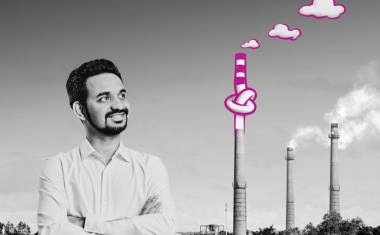The Chemical Distributor’s New Normal

Great Expectations - Long gone are the days where the standard chemical distributor's job was to take products from one place to the next. In the modern supply chain, distributors are expected to act as service providers for their customers, offering skills and add-ons that go far beyond logistics. Neville Prior, CEO of Cornelius Group and freshly appointed vice president of the European Association of Chemical Distributors (Fecc) said that manufacturers will continue to expect more and more efficiencies from their relationships with distributors. Brandi Schuster spoke with him about what this means for the industry, especially for the smaller players.
CHEManager Europe: What is the chemical distributor's role in the modern supply chain?
Neville Prior: The chemical industry is global, complex and quite fragmented. A plethora of products are used across a wide variety of end uses, from petrochemicals through plastics, food and personal care, just to name a few. The customer base is hugely variable and demanding, and alongside challenges of logistics, marketing and sales as well as variable delivery size, chemical manufacturers face great complexity in bringing their products to the end-users.
How has that role evolved?
Neville Prior: The role of the distributor is not what it was just a few decades ago. Distributors are no longer treated as "just another customer" by manufacturers, but are increasingly recognized as key partners. This has meant that distributors have had to improve their capabilities from a mere sales role to include added-value activity. This could include a number of capabilities such as warehousing and storage; customized logistics solutions based on the product and its end market; user-friendly repackaging; tech and lab support facilities; integrated IT solutions; and marketing savvy. The list goes on and on.
What service add-ons have become standard?
Neville Prior: In a world where manufacturers look to focus on what they do best - innovate and manufacture - distributors find there services increasingly in demand. Our role obviously depends on a number of factors, but it is primarily driven by the capability of the manufacturer as well as the demands of both the end-user and geographical markets.
A large, integrated manufacturer will be able to adequately handle their large customers in many cases, while smaller players will look to distributors to handle the entire market. Markets such as commodity chemicals may simply need a good logistic solution, whereas the personal care industry needs far more. Emerging markets are likely to offer a complex network of fragmented customers, while mature markets are likely to see a consolidation of the customer base. Each offers its own challenges and its own solutions.
M&A activity within the sector was buzzing a few years ago but slowed in 2012. Has the predicted upswing for 2013 become a reality?
Neville Prior: In my opinion, there has not been a significant upswing in M&A activity, which is not to say that M&A activity does not exist. I believe this is not so much due to economic reasons, although uncertainty must play its role. Rather, I believe that it is a lack of suitable targets. In the mature markets of North America and Europe, smaller companies with niche expertise are being acquired, rather that the headline making marge deals. In emerging markets, acquisition is more about gaining extended geographic coverage. As the larger players gain good coverage in those emerging markets, the rationale will switch across to that seen in mature markets.
How can smaller distributors compete with the large multinationals?
Neville Prior: The large multinationals have a global market share of less than 20%, which leaves a large chunk of the market for others. With a global growth rate for the industry nearing 10%, there are many opportunities. However, many of the big producers are not looking to distributors on a single-country basis, but on a regional or even global basis.
It is certain that the smaller distributors will find it difficult to compete at that level. The smaller distributors will need to consider their strategies very carefully, and many will aim to fill a niche in which they have specialized knowledge or skills. Those with the capability will need to consider regional expansion, either through acquisition, partnerships or starting new businesses in new countries. The smaller distributors will have to ensure that they are offering tailored solutions that customers and manufacturers value.
What is the outlook for small European based distributors?
Neville Prior: There are a number of schools of thought concerning the outlook for smaller distributors. Those distributors that offer something special will always have their place, as long as they can be seen as different. The opportunity for distributors in Europe will continue to expand as manufacturers outsource more, but it will be increasingly more difficult for smaller players to appeal to those manufacturers.
I can see a number of distributors looking towards manufacturers in emerging markets for their source of products, and this is a viable strategy. They will however need to ensure legislative and quality compliance, as well as building relationships and understanding the different business cultures that are in place. This will take time and money but will offer a sustainable business for those who do it properly. Smaller companies may look to create partnerships with other similar businesses across the region to increase their coverage and purchasing opportunity, and there are several examples of this already occurring.
However, for those companies, it would be a mistake to try to compete globally with multinationals that already have extensive systems and networks in place. There is a place in the market for good, small companies, so find your niche!
What will the sector look like in 10 years?
Neville Prior: It is my belief that the sector will continue to expand through to 2023, as manufacturers continue to concentrate on innovation, manufacturing efficiency and servicing key global accounts. Smaller customers and even regions will continue to be outsourced through distributors. However, manufacturers will look more and more to gain efficiencies from these relationships. Distributors will be looking to enhance their services, and I am sure we will see more distributors creating centers of technical excellence to support their customers.
Distributors will stock a wider range of products, allowing manufacturers to optimize their inventory holdings, and there will be a growing move to vendor managed inventory. There will also be more activity in the mixing/blending/formulating sector, reducing complexity for manufacturers, and adding value to partially commoditized products. These services will go hand-in-hand with filling/packaging/labeling capabilities and coping with local legislation.
Will there be further consolidation?
Neville Prior: Consolidation will continue, but I would see the emphasis on that being in the emerging economies, where there is much more of a fragmented market, faster growth rates in chemical consumption, and a greater need for supra regional and global players to be present. Mature markets such as Europe may see some consolidation, particularly between small and medium size players, as they strive to cover markets across national boundaries. There will certainly be casualties along the way, particularly amongst those distributors who have no differentiated offer and are financially less able to cope with the rafts of legislation and increased demand from customers and manufacturers for more than "just" a sales force.
You were just elected vice president of the Fecc. How closely does the European Association of Chemical Distributors work with other national associations?
Neville Prior: Fecc aims to be the voice of our industry in Europe and as such represents a broad spectrum of that industry. Fecc has direct company members as well as national association members and enjoys an excellent relationship with both. Technical committees as well as the board are supported by both types of members alike, and Fecc recognizes that it must work closely with its national association members on matters of importance in Europe. To this end there is excellent mutual cooperation. However, we live in a global society, and work increasingly in a global business, and Fecc cannot limit its horizons to just Europe. It has a strong presence in ICCTA (International Council of Chemical Trade Associations), where there is the aim to progress the take up of Responsible Care on a global basis. To this end Fecc works alongside non-European associations such as those in North America and China.
If you could fulfill just one goal as VP of the Fecc, what would it be?
Neville Prior: We all want to live on a sustainable planet, in a safe and secure environment, and of course we fully understand the requirement for legislation. If I could fulfill a single goal, then it would be to ensure that legislation going forward in Europe ensures that sustainability is maintained, but also that our industry can continue to grow and thrive. Without the chemical industry and distributors, then innovation will be stifled, manufacturing become less efficient, and our standards of living will fall. So my dream is to help to create a European market, where the environment and its citizens are protected, yet we can create fantastic and innovative products that feed into the economy and help towards sustainability on economic grounds also.





